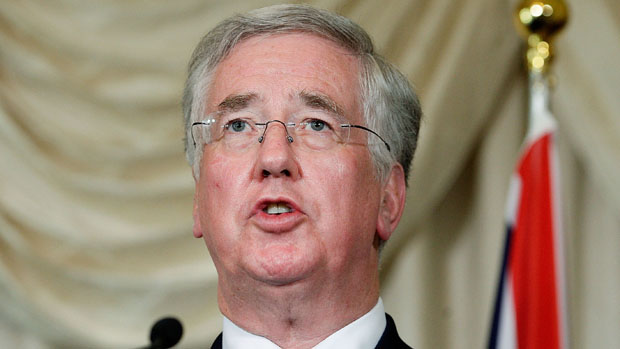Putin as big a threat to Europe as Islamic State, says Fallon
Defence secretary warns that Russia poses a 'real and present danger' to the Baltic States

A free daily email with the biggest news stories of the day – and the best features from TheWeek.com
You are now subscribed
Your newsletter sign-up was successful
Vladimir Putin is as much of a threat to Europe as Islamic State, posing a "real and present danger" to Latvia, Lithuania and Estonia, the UK's Defence Secretary has warned.
Michael Fallon said that Nato is "getting ready" for any kind of "aggression from Russia whatever form it takes".
The UK will be sending military personnel to eight Nato sites in eastern Europe to reinforce their defences and deter any Russian challenge, he said.
The Week
Escape your echo chamber. Get the facts behind the news, plus analysis from multiple perspectives.

Sign up for The Week's Free Newsletters
From our morning news briefing to a weekly Good News Newsletter, get the best of The Week delivered directly to your inbox.
From our morning news briefing to a weekly Good News Newsletter, get the best of The Week delivered directly to your inbox.
The Times describes his comments as "some of the toughest language of any senior British minister towards Russia since the crisis over Ukraine erupted a year ago".
It comes as Ukrainian troops yesterday pulled out of the strategic town of Debaltseve after it was stormed by pro-Russian rebels – a "highly significant victory" for the Moscow-armed separatists, reports The Guardian.
Fallon suggested that the ceasefire in eastern Ukraine had all but collapsed and raised concerns that Putin would deploy the techniques used in Ukraine, such as sending in armed men in unmarked military uniforms, to destabilise the Baltic States.
Speaking to journalists on board a flight to Sierra Leone, where British forces are helping to fight Ebola, Fallon said the likelihood of such warfare techniques being deployed in Latvia, Lithuania and Estonia was a "very real and present danger".
A free daily email with the biggest news stories of the day – and the best features from TheWeek.com
All three countries are members of Nato, meaning that an attack on one could trigger all Nato members to respond.
Asked whether the West was ready for war with Russia, he said: "Nato has to be ready for any kind of aggression from Russia whatever form it takes. Nato is getting ready."
He added that it was not a new Cold War because it appeared that tensions were "warming up".
Moscow has sharply increased its defence spending, and two weeks ago two Russian bombers were flown down the English Channel, prompting the UK to scramble jets to see them off, Fallon said.
"That just shows you, you need to respond," he added. "Each time he does something like that, you need to be ready to respond."
-
 Local elections 2026: where are they and who is expected to win?
Local elections 2026: where are they and who is expected to win?The Explainer Labour is braced for heavy losses and U-turn on postponing some council elections hasn’t helped the party’s prospects
-
 6 of the world’s most accessible destinations
6 of the world’s most accessible destinationsThe Week Recommends Experience all of Berlin, Singapore and Sydney
-
 How the FCC’s ‘equal time’ rule works
How the FCC’s ‘equal time’ rule worksIn the Spotlight The law is at the heart of the Colbert-CBS conflict
-
 Putin’s shadow war
Putin’s shadow warFeature The Kremlin is waging a campaign of sabotage and subversion against Ukraine’s allies in the West
-
 Alexei Navalny and Russia’s history of poisonings
Alexei Navalny and Russia’s history of poisoningsThe Explainer ‘Precise’ and ‘deniable’, the Kremlin’s use of poison to silence critics has become a ’geopolitical signature flourish’
-
 What happens now that the US-Russia nuclear treaty is expiring?
What happens now that the US-Russia nuclear treaty is expiring?TODAY’S BIG QUESTION Weapons experts worry that the end of the New START treaty marks the beginning of a 21st-century atomic arms race
-
 Epstein files topple law CEO, roil UK government
Epstein files topple law CEO, roil UK governmentSpeed Read Peter Mandelson, Britain’s former ambassador to the US, is caught up in the scandal
-
 Iran and US prepare to meet after skirmishes
Iran and US prepare to meet after skirmishesSpeed Read The incident comes amid heightened tensions in the Middle East
-
 Israel retrieves final hostage’s body from Gaza
Israel retrieves final hostage’s body from GazaSpeed Read The 24-year-old police officer was killed during the initial Hamas attack
-
 China’s Xi targets top general in growing purge
China’s Xi targets top general in growing purgeSpeed Read Zhang Youxia is being investigated over ‘grave violations’ of the law
-
 Ukraine, US and Russia: do rare trilateral talks mean peace is possible?
Ukraine, US and Russia: do rare trilateral talks mean peace is possible?Rush to meet signals potential agreement but scepticism of Russian motives remain